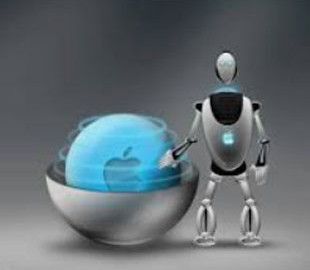At Apple Inc. there is a team exploring the possibilities of personal robotics, which could potentially be the "next big thing" company, reports Bloomberg.
According to unofficial information, Apple engineers are studying a mobile robot which can follow the owner around his house. The iPhone maker has also developed an improved desktop home device – intelligent display.
While the work is still in its early stages and it is unclear whether these products will eventually be released – Apple is under increasing pressure to find new sources of revenue. In February, the company canceled the electric car development project. Vision Pro's mixed reality glasses are expected to take years to develop before they generate much revenue.
With the help of robotics, Apple will be able to gain a foothold in consumers' homes and benefit from advances in artificial intelligence. But it is not yet clear what approach can be used. Although the robotic intelligent display has gone much further – it has been added and removed from the company's roadmap over the years.
After Bloomberg reported on the robotics work, Apple shares fell 1% – investors reacted coolly to this news. At the same time, shares of Roomba iRobot Corp. increased by 17% in a short time – investors believed that this company could benefit from Apple's interest in robots. But these "excitements" on the market lasted only a few hours.
The desktop robotics project first interested Apple's top management a few years ago. The idea was for the display to mimic the movement of a person's head (such as nodding) during a FaceTime video call session. It will also have features to single out one person in a crowd during a video call.
But the company is wondering whether users are ready to pay big money for such a device. There were also technical problems related to stable placement of the display on a small stand. According to the sources, there is disagreement among Apple executives about whether to pursue the product at all.
Next to the campus in Cupertino, California, Apple has a facility that resembles the inside of a house – a place to test future devices and initiatives for the home.
The quest for the "next big product" is Apple's obsessive idea since Steve Jobs. But it's becoming increasingly difficult to imagine a product that could match the iPhone, which accounted for 52% of the company's sales last year.
The car could increase Apple's revenue by hundreds of billions of dollars, in part because its estimated price was around $100,000. Not many other products have this kind of growth potential, but Apple has a number of projects in the pipeline, including a revamped Vision Pro, touch-screen Macs, AirPods with built-in cameras, and new health technologies such as a non-invasive blood sugar monitor blood.
Artificial intelligence is another important area, even though Apple still lags behind in chatbots and other generative technologies. In the very early stages, Apple AI developers are exploring the possibility of using algorithms to help robots navigate cluttered spaces in people's homes.
If the robot goes ahead, Apple won't be the first tech giant to develop a home robot. Amazon.com introduced a model called Astro in 2021, it currently costs $1,600. But the company does not want to offer the device in larger quantities, it remains a niche product. Last year, it introduced a more business-oriented version of the robot on wheels, designed to work as a security guard.
Perhaps the most popular in the home robot market remains the Roomba vacuum cleaner, which debuted more than two decades ago. Amazon tried to buy its developer – iRobot in 2022, but regulatory opposition doomed the deal. Other companies have also introduced the idea of humanoid robots that mimic the size and movement of humans.
The positive aspect of Apple's failed car project is that it served as the basis for other initiatives. The AI chip built into the iPhone and Mac was designed for the car. This project also laid the groundwork for Vision Pro, as Apple explored the possibility of using virtual reality in divination.
Work with robots began in 2019 as part of the automotive project. At the time, it was managed by Doug Field, who is now the top manager of electric vehicles at Ford Motor. He recruited a number of executives to work on robotics initiatives. The group included Nick Sims, who was Google's home product manager; Dave Scott, who left Apple in 2021 to start a mobile MRI machine company and then returned in 2022 to work on Vision Pro; Hans Wolfram Tappainer, co-founder of artificial intelligence and robotics company Anki.
The original concept of the robot was a device that could move independently without human intervention (like a car with autopilot) and serve as a video conferencing tool. One of Apple's ideas is to teach a robot to do household chores, such as washing dishes in the sink. But for this you need to overcome extremely difficult engineering tasks, which is unlikely in this decade.
On its website, Apple advertises jobs related to robotics. This indicates that the company is trying to expand the teams working on the project.

